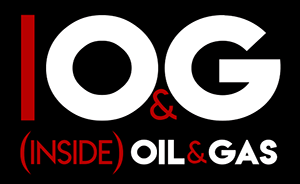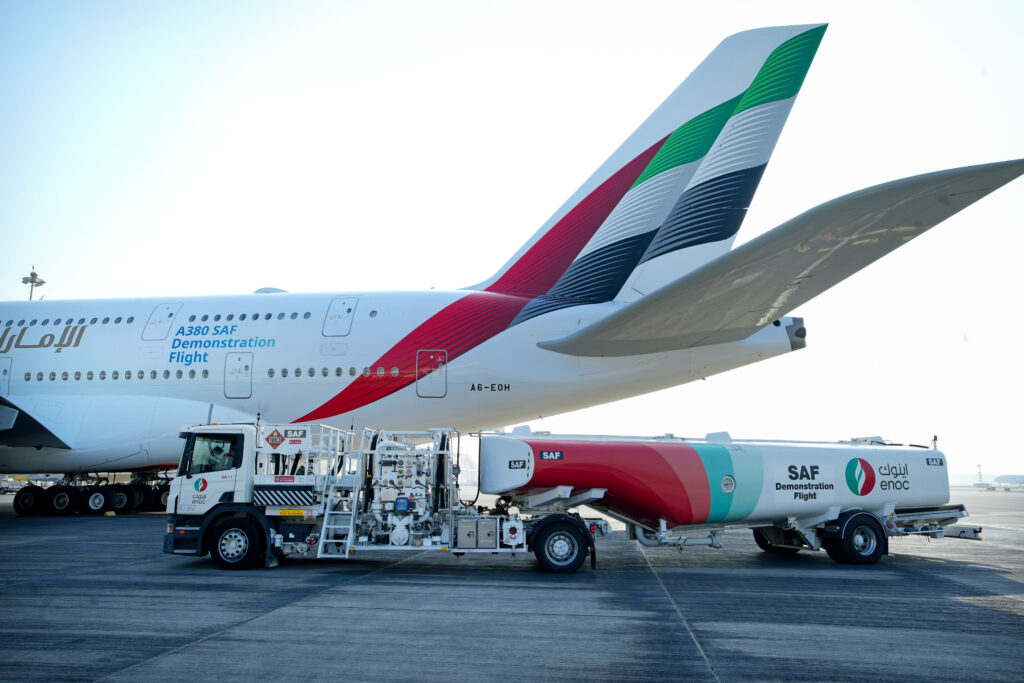Emirates has become the world’s first airline to operate an A380 demonstration flight using 100% Sustainable Aviation Fuel (SAF). The flight, proudly commanded by Captain Khalid Binsultan and Captain Philippe Lombet, took off from Dubai International Airport (DXB) with one of four engines powered on 100% SAF, helping demonstrate its potential as a drop-in replacement that matches jet fuel’s technical and chemical requirements, while being a more sustainable alternative. SAF can reduce carbon emissions by up to 85%* over the fuel’s life cycle when compared to conventional jet fuel.
Demonstration flights like the one conducted today pave the way for future standardisation, qualification and adoption for 100% SAF flying, as governments adopt broader strategies to support the production and scale up of SAF. The A380 demonstration flight underlines the performance and compatibility of SAF, making it a safe and reliable fuel source, and contributes to the growing body of research carried out by the industry to evaluate the beneficial effects of 100% SAF on aircraft performance. SAF is currently capped at a 50% blend limit in engines for commercial flights.
The Emirates A380 demonstration flight comes as the aviation industry, international organisations, regulatory bodies and high-level officials driving policy-related decisions converge in Dubai for the Third International Civil Aviation Organization (ICAO) Conference on Aviation and Alternative Fuels (CAAF/3). Dedicated collaborators from Airbus, Engine Alliance, Pratt & Whitney, Neste, Virent and ENOC have been working on the testing, technical assessments and data analysis for today’s flight.
The 100% drop-in SAF used on today’s flight includes renewable aromatics and closely mimics the characteristics of conventional jet fuel. This is the first time that drop-in SAF has been used on an A380 aircraft, with the expectation of full compatibility across the aircraft’s existing systems. The flight carried four tonnes of SAF, comprised of HEFA-SPK provided by Neste (hydro processed esters and fatty acids synthetic paraffinic kerosene) and HDO-SAK from Virent (hydro deoxygenated synthetic aromatic kerosene). ENOC helped to secure the neat SAF comprised of HEFA-SPK, and blended it with Sustainable Aviation Kerosene (SAK) at its facility in Dubai International Airport ahead of the demonstration, and also carried out into-plane services.
The 100% SAF was used in one Engine Alliance GP7200 engine, while conventional jet fuel was used in the other three engines. The PW980 auxiliary power unit (APU) from Pratt & Whitney Canada also ran on 100% SAF.
Last week, robust engine testing for one A380 Engine Alliance GP7200 engine using 100% SAF was carried out, with the objective of validating the engine’s capability to run on the specially blended 100% drop-in SAF without affecting its performance or requiring any modifications. Ground engine testing took place at the state-of-the-art Emirates Engineering Centre in Dubai.
Adel Al Redha, Chief Operating Officer, Emirates Airline said: “Emirates is the first passenger airline in the world to operate an A380 with 100% drop-in SAF powering one of four Engine Alliance GP7200 engines. This is another proud moment for Emirates and our partners, as we put words into action with the research into and the trialling of higher concentrations of SAF to eventually lead to industry adoption of 100% SAF flying. This marks another significant step in validating the use of SAF in one of the engines of the A380, a wide-body aircraft with four engines. The growing global demand for lower-emission jet fuel alternatives is there, and the work of producers and suppliers to commercialise SAF and make it available will be critical in the coming years to help Emirates and the wider industry advance our path to lower carbon emissions.”
“Increasing the use of SAF is critical to achieving the goal of net-zero carbon emissions for aviation, and we are dedicated to ensuring all of Pratt & Whitney’s engines and APUs are compatible with current and future SAF specifications, up to 100%,” said Pratt & Whitney Chief Sustainability Officer Graham Webb. “This in-flight demonstration on an Emirates A380 continues to build momentum towards establishing future standards for 100% SAF, which will help maximize the potential lifecycle emissions reduction for all commercial aircraft flying in the decades ahead.”


